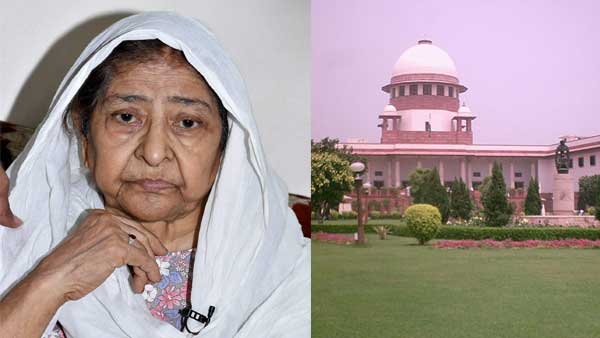Appearing before the Supreme Court, Zakia Jafri’s lawyer Kapil Sibal has been arguing that the special investigation team’s closure report into whether certain prominent persons can be held responsible for the 2002 communal violence in Gujarat was not justified. Zakia’s husband and Congress MP Ehsan Jafri was one of 68 people killed during the Gulberg Society massacre on February 28, 2002.
On February 8, 2012, the SIT filed a closure report giving a clean chit to then Gujarat chief minister Narendra Modi and 63 others, including senior government officials, saying there was “no prosecutable evidence” against them. Both a magistrate’s court and the Gujarat high court had later upheld the SIT’s report.
Zakia’s case is not the same as the Gulberg Society case – while the latter deals only with the massacre that took place at Gulberg Society, Zakia’s case is an pin criminal and administrative liability and accountability in approximately 300 incidents over 19 districts of Gujarat in 2002.
The other petitioner in the case is Citizens for Justice and Peace, a human rights group led by activist Teesta Setalvad.
While hearing the case on Tuesday and Wednesday, the Supreme Court bench of Justices A.M. Khanwilkar, Dinesh Maheshwari and C.T. Ravikumar said it would like to go through the closure report, as well as the magistrate’s reasoning while accepting it.
The closure report, Sibal has argued in court over the last three days, does not mention several facts that the SIT had been made aware of. On June 8, 2006, he said, the petitioners had submitted a detailed complaint to the then DGP, P.C. Pande. In over 100 pages, the complaint detailed the ‘conspiracy’ they thought was at play after the Godhra train burning on February 27, 2002. They had also affixed evidence gathered from previous SIT probes along with the complaint.
The magistrate’s court and high court, Sibal argued, did not take account of the state’s responsibility in the matter. “The duty of the court…that’s the central question the lordships will have to decide…once the Magistrate receives information which according to us constitutes an offence, the Magistrate is duty bound to not only look at the information but also take cognisance of the offence.”
All the evidence submitted to the SIT merited a thorough probe, Sibal argued, yet a closure report was filed without proper investigation. All we want is that our matter is looked at…if you don’t investigate, just file a closure report, where do we go? …This Republic is too great to deny a person justice.”
All the material provided came from official sources such as records of the state intelligence bureau, the police exchanges and control rooms (PCR) documents, etc., Sibal argued. The magistrate, however, refused to look into the matter of the larger conspiracy. “My lords, our case was that there was a larger conspiracy at play, where there was bureaucratic inaction, police complicity, hate speech and a conspired directed unleashing of violence. The Magistrate said I won’t look at it because the supreme court prevents me from doing that and only look at the Gulberg society case.” Sibal argued before the Supreme Court bench.
The petitioners have argued that several facts that are widely known point to the fact that there was a larger political conspiracy at play that both encouraged and allowed the communal violence to take place. “… the prelude and build-up of a volatile atmosphere prior to February 27, 2002, the post mortems being conducted in the wide open in violation of statutory provisions, no preventive arrests and delayed implementation of curfew in Ahmedabad despite widespread violence from February 27, 2002 onwards, among other issues,” prove this, the CJP has said.
Sibal also argued on Thursday that a private person, Jaydeep Patel, was handed the bodies of those killed in Godhra. “Question is, contrary to all rules of procedure, how was a dead body given to this individual through an official communication?” said Sibal, adding it calls for serious investigation.
“By the time these bodies reached Ahmedabad the crowd had gathered. Who made phone calls? How did anyone know that Patel was taking dead bodies? I don’t know, but these have to be investigated. But SIT saying a departmental enquiry is not enough,” he submitted.
Responding to the petition, the SIT has claimed before the court that it completed a probe before filing the closure report. “We will show you that we have faithfully investigated everything,” said senior advocate Mukul Rohatgi, appearing for the SIT.
The hearing will continue on November 10.
The article was first published by ‘The Wire’.













God will give justice to all guilty and Modi. Whole Indian legal courts are controlled by BJP. So no justice will be done.